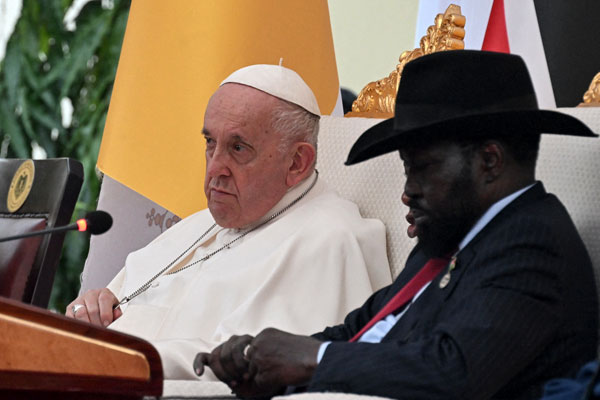Pope challenges Kiir, Machar on peace legacy

Author, Augustine Bahemuka. PHOTO/FILE/COURTESY
What you need to know:
- In 2018, Salva Kiir and his long-time rival, Dr Riek Machar signed the Revitalised Agreement on the Resolution of the Conflict in the Republic of South Sudan, which among other transformational elements, proposed a power-sharing deal and unification of the highly polarised belligerent military factions.
“We present ourselves to you and to this people”, Pope Francis addressed himself to political leaders of South Sudan, “In the name of Jesus Christ, the Prince of Peace.” He was accompanied by Rt Rev Iain Greenshields, moderator of the Church of Scotland and Most Rev Justin Welby, Archbishop of Canterbury, whose idea it was to organise this pilgrimage of peace to South Sudan.
President Salva Kiir referred to the visit as “historical” . In the previous article, we established the ecumenical context of this visit; however, in this piece, I share my reflections on three key highlights from the pilgrimage.
First, emphasis on call to action. The pontiff and his companions did not mince their words when addressing South Sudan political leaders.
In fact, Pope Francis confessed that his messages could have sounded “blunt and direct”, however, they arose from the concern with which he follows the events in this country. He appealed to God to bring the plea of the people of South Sudan, who are athirst for peace and have become weary of poverty, insecurity and displacement caused by interethnic conflict and violence.
In 2018, Salva Kiir and his long-time rival, Dr Riek Machar signed the Revitalised Agreement on the Resolution of the Conflict in the Republic of South Sudan, which among other transformational elements, proposed a power-sharing deal and unification of the highly polarised belligerent military factions.
However, progress of the peace process has been slow owing to, among other factors, non-committal political leaders and occasional ethnic insurgency and violence. The pope remarked: “No more bloodshed, no more conflicts, no more violence and mutual recriminations about who is responsible for it. No more destruction: It is time to build! Leave the time of war behind and let a time of peace dawn!”
It was not the first time that such pleas have been made.
However, on this particular occasion, the message sounded different on two fronts: moral authority and apolitical tone of the religious leaders; and personality of Pope Francis, who has vividly expressed and reiterated his closeness to the plight of the poor and the suffering. The writing on the wall was made very clear: it is time to build peace and restore relationships.
Second, meeting the forcibly displaced persons (IDPs). The three religious principals met IDPs in Bentiu, Malakal and Juba camps and listened to their stories, most of which demonstrated children born and raised hearing the sound of gunshots.
However, the pontiff urged the suffering to find their place in restoring peace in their country. I picked three important messages from his address to IDPs. One, to the women: He appealed that all women and girls be protected, respected, valued and honoured because in them lies a natural propensity of re-birthing peaceful and cohesive societies, only if they are given opportunity in decision-making.
Two, to the youth: He challenged young people, who constitute 74 percent of the population to rewrite their country’s history.
Three, he dared to challenge the people to learn and speak each other’s local dialectic, which would deepen their understanding and appreciation of each other’s cultures as families mingle and widen social networks beyond tribal identity.
What next? What are some of the low-hanging fruits that the peace pilgrimage bore? How will South Sudan transform the fresh memories of the papal visit into bold steps of building durable peace? How shall the political leaders in the power-sharing arrangement transition from their “warlord” mentality into peacemaking icons? Pope Francis did not hesitate to haunt their souls when he told them to choose whether they would like their names to be venerated as peacemakers or erased from living memory as enemies of peace.
We stand with the people of South Sudan as they re-map their way to building lasting peace.
Mr Bahemuka is a commentator on peace, religion and society.




